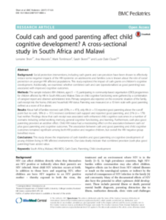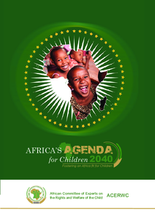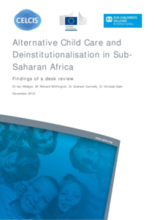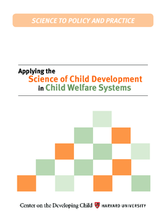Displaying 191 - 200 of 461
In examining to what extent poverty reduction policies and family support services mitigate the risk factors associated with out-of-home placement, this study found that absolute poverty influences a child’s risk factors for out of home placement.
This study explored the impact of cash grants on children’s cognitive development. Additionally, the authors examined whether combined cash and care (operationalised as good parenting) was associated with improved cognitive outcomes.
This study describes the impact of cash grants and parenting quality on 854 children aged 5–15 (South African and Malawi) on educational outcomes including enrolment, regular attendance, correct class for age and school progress (controlling for cognitive performance).
This article discusses the results of a cross-country research project in Sub-Saharan Africa regarding the impact of social protection on loss of parental care, support to foster or kinship care and quality of care and wellbeing in Sub-Saharan Africa.
In this Innocenti Podcast, Tia Palermo discusses The Transfer Project, a government run large-scale social cash transfer program in Sub-Saharan Africa.
The Africa’s Agenda for Children, to be adopted by the Committee, presents measurable goals and priority areas to which the African Union and its Member States commit themselves for the coming 25 years.
This desk review provides a brief mapping and summary of existing knowledge on alternative care and deinstitutionalisation in Africa.
This study underscores the fact that visible minority families receiving child protective services are a far from homogeneous group and that there are a number of effective methods that can be used with them.
This article examines how urban Congolese refugees in Kenya promote psychosocial well-being in the context of structural vulnerability.
This paper explores the ways that developmental science can inform and strengthen the child welfare system to better support the children, families, and communities it serves.




